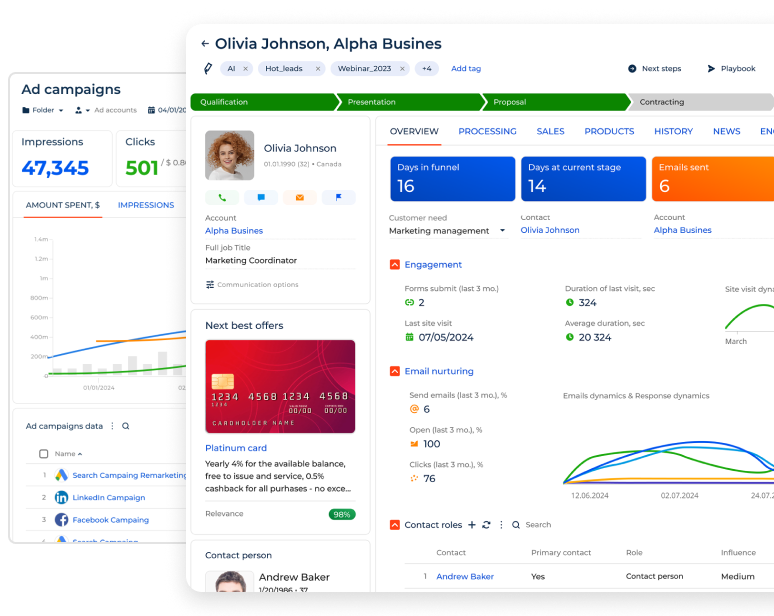-
No-Code
Platform
-
Studio
No-code agentic platform delivering the fastest time-to-value and the highest ROI
-
Studio
-
AI-Native CRM
CRM
-
AI-Native CRM
New era CRM to manage customer & operational workflows
CRM Products -
AI-Native CRM
- Industries
- Customers
- Partners
- About
Accelerate Fintech Growth With Creatio’s Agentic CRM

The fintech industry is expanding rapidly, with nearly half of U.S. consumers using a fintech product back in 2021, and 73% of banking interactions happening through digital channels. This trend continues to drive fintech growth, but it also brings increased competition as traditional banks begin offering fintech-like services. In this highly competitive environment, fintechs need to find a way to deliver more seamless, personalized, and secure experiences to draw customers. To do so, they need CRM platforms tailored to their unique needs.
In this article we’ll cover the benefits, key features, and popular use cases of fintech customer relationship management systems that empower financial technology companies.
What is a CRM for Fintech?
Fintech CRM is a customer relationship management software designed to support the unique needs of digital-first financial services providers, including neobanks, peer-to-peer payment platforms, automated portfolio managers, and stock-trading apps. With fintech CRM solutions, companies can securely store sensitive financial information, automate financial workflows, and ensure compliance with strict regulatory standards thanks to features tailored to their business processes.
The State of AI Agents & No-Code: FinServ Edition
Learn how financial leaders use AI agents and no-code to fuel smarter transformation
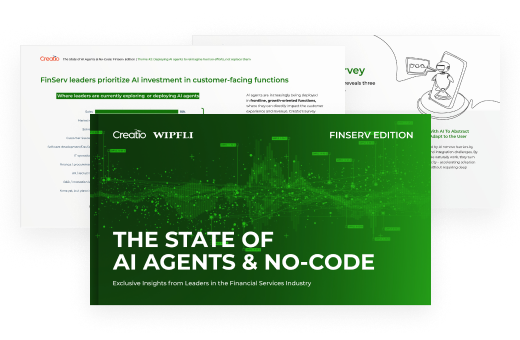
Key Features of Fintech CRMs
Modern fintech CRMs provide AI-powered features tailored to unique needs of fintech companies that help them increase their operational efficiency, make smarter decisions, and improve customer experiences.
Key features of fintech customer relationship management platforms include:
Customer 360
Fintech CRMs store customer information and provide a 360-degree view of each client, including their demographic data, previous history with the company, current portfolio, and financial goals. AI further strengthens data management in fintech CRMs by automatically extracting information from unstructured sources, such as emails, documents, call transcripts, support tickets, etc., updating profiles in real-time. AI ensures that all customer records are complete and up to date, eliminating the need for manual data entry.
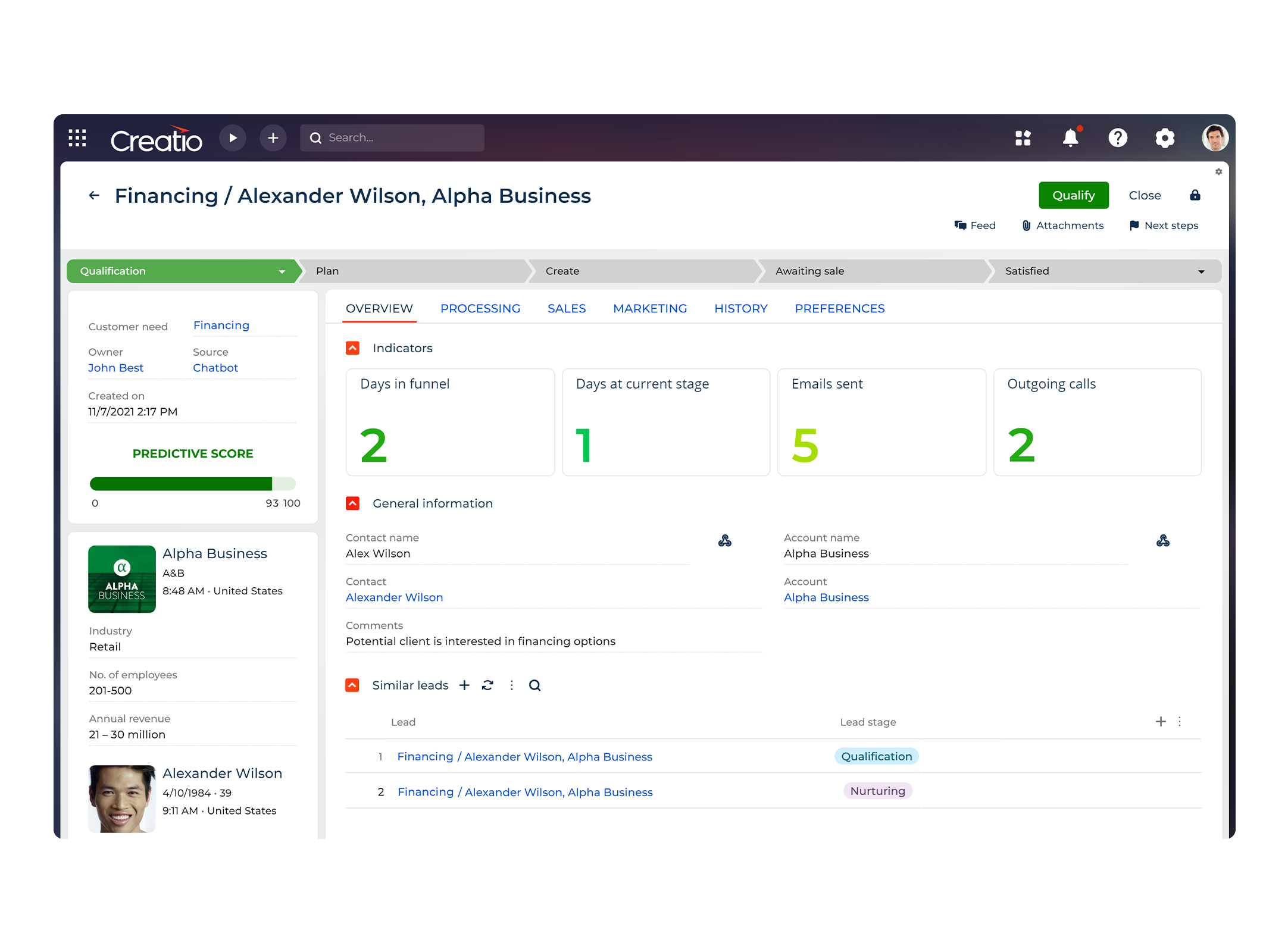
Account opening and onboarding automation
With a CRM for fintech, companies can streamline their account opening and provide seamless onboarding experiences for their clients. Thanks to workflow automation capabilities, fintechs can automate screening routines, speed up approvals, and digitize document management. AI enhances this process by intelligently analyzing application data, automating identity verification, and personalizing onboarding journeys for each client.
KYC compliance tools
Fintech CRM solutions streamline the Know Your Customer (KYC) process by enabling secure, remote identity verification, eliminating the need for in-person checks. This is possible thanks to a unified CRM database that centralizes information, ensuring customer data is accurate, complete, and consistent across all touchpoints. AI-powered tools provided by modern fintech CRMs further enhance this process by automatically detecting missing, inconsistent, or suspicious profile details, helping fintech companies effectively assess risks and meet regulatory requirements.
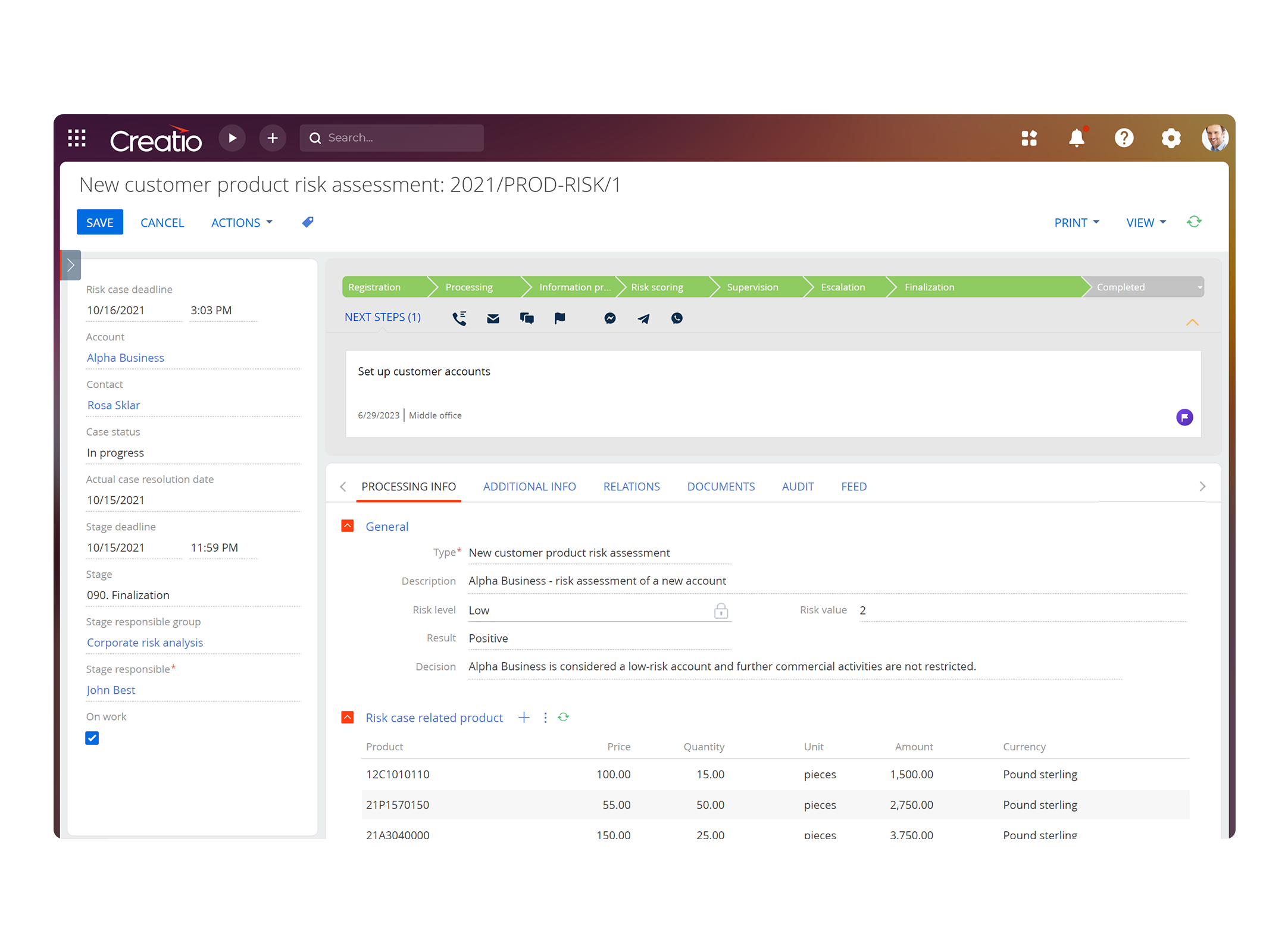
Fraud detection and monitoring
Fintech CRMs monitor activity in real time and flag suspicious behavior, such as unusual transactions, changes in account activity, login attempts from high-risk locations, or inconsistencies in customer identity data. Fraud detection can be also enhanced with AI tools that identify complex patterns and anomalies that traditional rule-based systems might miss and continuously adapt to emerging fraud tactics. By combining real-time monitoring with AI-driven risk analysis, fintech CRMs help detect fraud early and protect both the company and its clients from financial loss.
Portfolio management and transaction tracking
Fintech CRMs enable comprehensive tracking of customers’ investment portfolios and transaction histories, helping support teams quickly understand each client’s financial activity and preferences. Thanks to this information, automated portfolio managers and financial advisors can effectively manage clients' portfolios and tailor investment recommendations to customer financial goals and risk tolerance.
Real-time alerts and notifications
Timely communication is vital in fintech, especially for trading and investment activities. CRM systems can automatically deliver real-time alerts and notifications to customers about important events, such as market fluctuations, price triggers, or account updates.
Integrated document management
Managing sensitive financial documents efficiently and securely is essential for fintech companies. Modern CRMs offer integrated document management features that centralize storage and facilitate management of contracts, disclosures, statements, and consent forms within the customer profile.
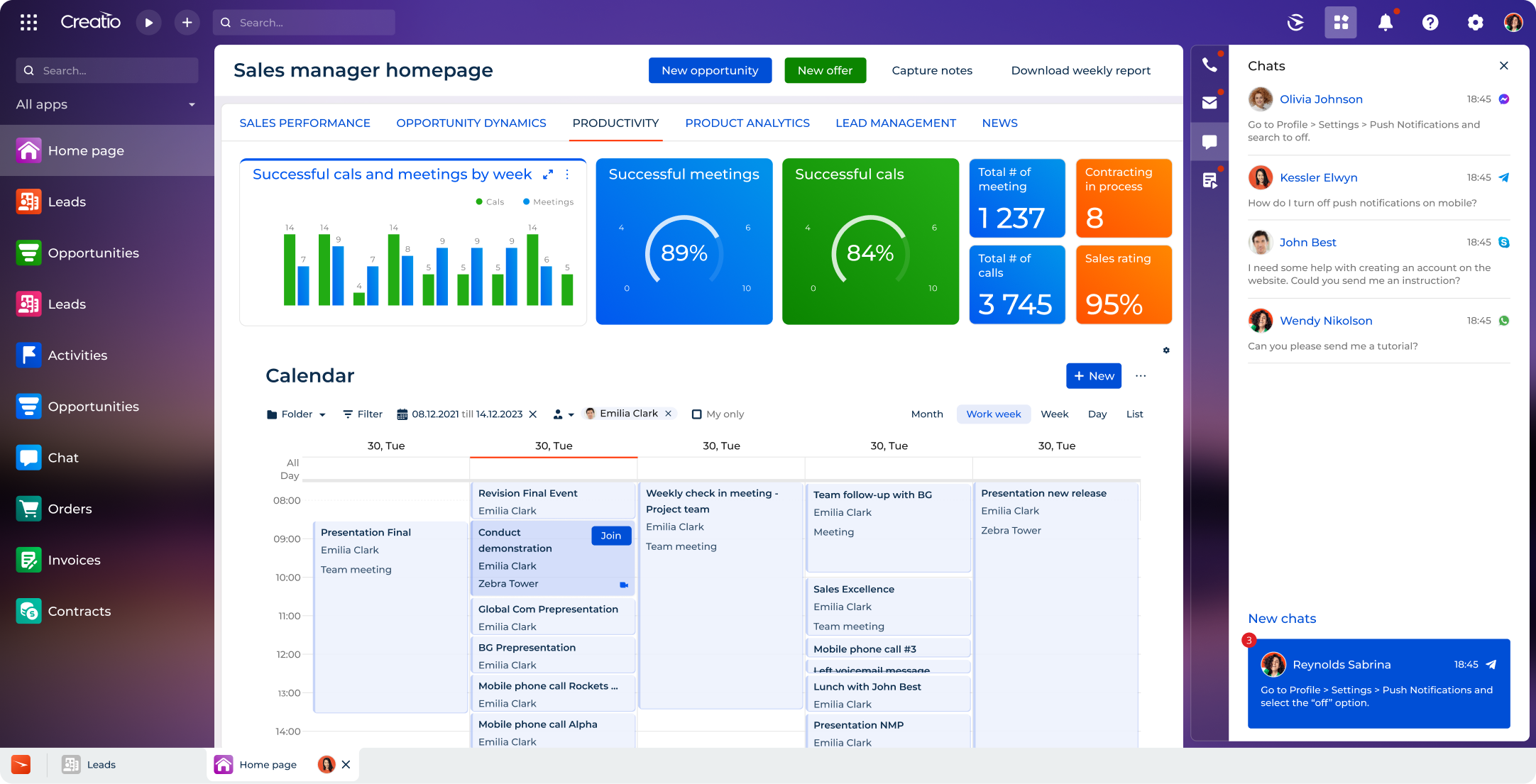
Seamless integration with key systems
CRM systems for fintech businesses seamlessly integrate with existing fintech systems, such as payment gateways, core banking platforms, and third-party fintech tools, ensuring consistent data flow and unified customer experience. They provide built-in integration capabilities and secure APIs that allow companies to connect their CRMs with existing systems and automate data exchange in real time.
Data security tools
Since fintech companies deal with sensitive financial information, they need robust security measures. CRMs provide data security features dedicated to fintechs, such as advanced encryption, multi-level authentication, and role-based access controls to ensure no unauthorized personnel has access to customer data.
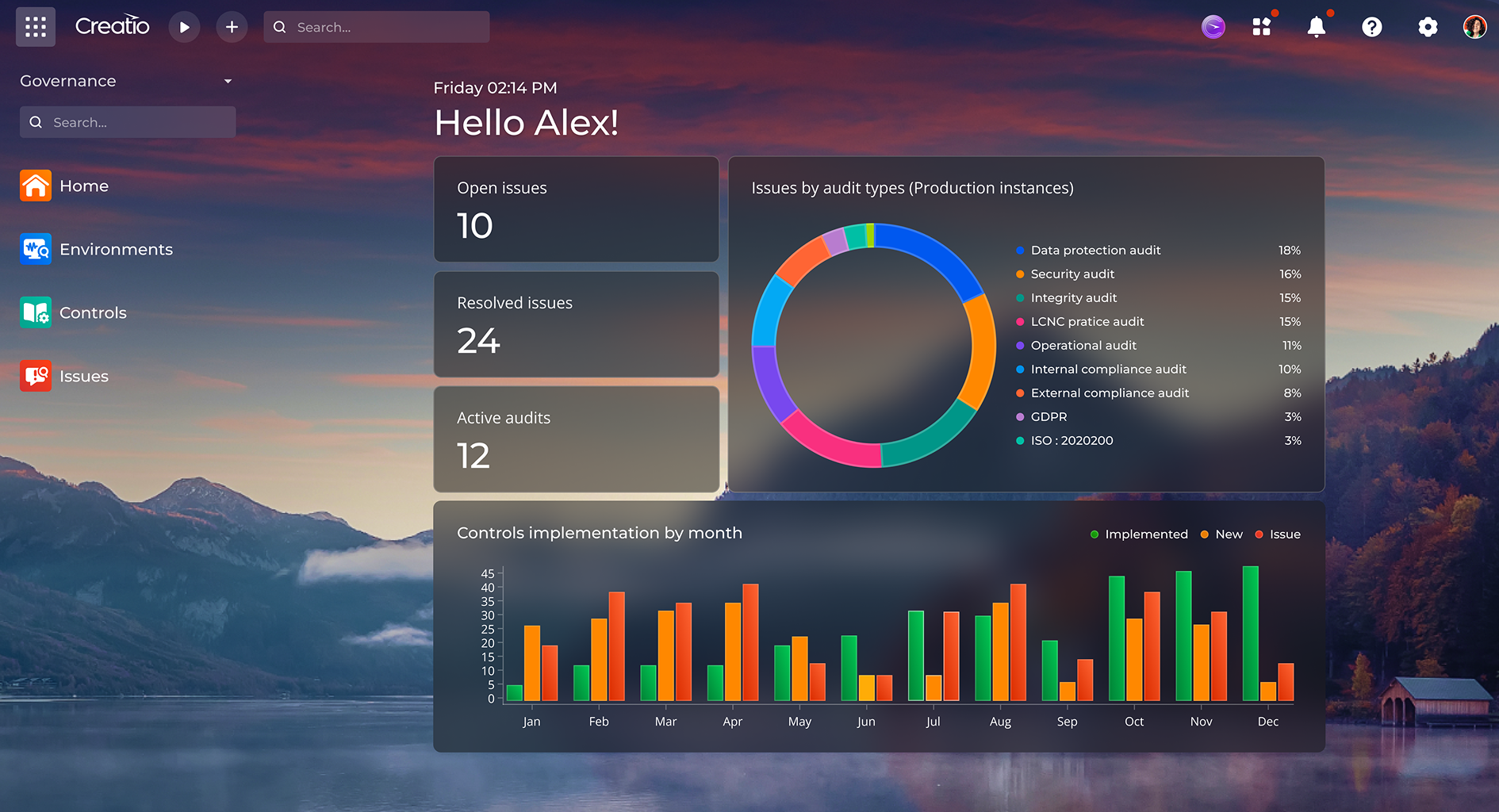
Analytics and reporting
Fintech CRMs provide analytics tools for automated analytics and reporting, helping fintech companies easily obtain valuable insights into customer activity, business performance, and compliance metrics to support data-driven decisions.
How Can CRM Be Used in Fintech?
Here’s how practical applications of fintech CRMs help solve real business challenges and unlock growth opportunities:
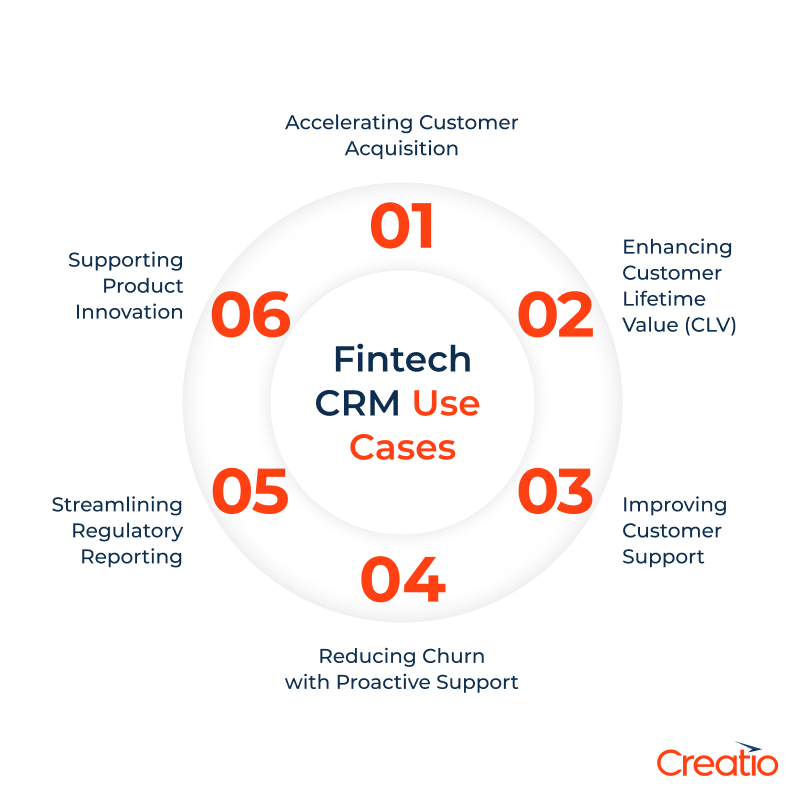
1. Accelerating customer acquisition
Fintech firms can use data insights derived from a fintech CRM system to identify needs of potential customers and use them to prepare personalized marketing and sales materials to accelerate customer acquisition.
By using AI tools, marketing teams can efficiently create targeted campaigns that resonate with potential customers, significantly enhancing customer engagement and conversion rates. Similarly, sales teams can use AI-driven insights to prepare personalized offers that answer the needs of each client to increase sales.
2. Enhancing Customer Lifetime Value (CLV)
Fintech CRM enables businesses to track customer behavior and financial needs in real-time. This allows sales teams to prepare tailored cross-selling and upselling offers, such as increased credit line, multi-currency accounts, etc. Since these offers are based on individual needs of each client, they are truly relevant to them and have a much bigger chance of engagement.
Sales professionals can also use AI to obtain cross-/upselling recommendations, generate personalized offers and send them automatically when the time is right. Thanks to this approach, sales teams can boost the customer lifetime value and revenue, without significantly increasing their workload.
3. Improving customer support
With easy access to a centralized data repository, customer support agents can quickly retrieve information relevant for support cases. Thanks to automatic data updates in fintech CRMs, customer accounts remain accurate at all times. This ensures a seamless handoff when another agent needs to step in and simplifies future follow-ups by providing full context and history in one place.
Modern fintech CRM systems are also equipped with AI-powered customer service tools, which can help agents find necessary information, compare cases with previously resolved ones, and generate accurate responses, speeding-up case resolution times. Additionally, frequent customer questions and simple tasks, such as checking the account balance, can be handled by AI chatbots, reducing agents' workload.
4. Reducing churn with proactive support
With a comprehensive view of customer activity and AI-powered sentiment insights, fintech companies can identify signs of dissatisfaction, such as decreased app usage, frequent support tickets, or negative feedback. Obtaining this knowledge early, allows the customer success team to intervene with personalized retention offers or support, preventing churn before it happens.
5. Streamlining regulatory reporting
Fintechs face complex regulatory requirements, such as GDPR, SEC, FINRA, that ensure the protection of customer data, transparency, and the integrity of financial markets. To facilitate regulatory report generation and save time on manual work, they can use a fintech CRM to automatically create reports and populate them with relevant data. Additionally, compliance teams can use AI tools to track regulatory requirements in real-time, ensuring ongoing adherence to the newest regulations.
6. Supporting product innovation
By collecting data regarding financial product usage patterns, customer feedback, and market trends within the CRM, fintechs can effectively identify unmet needs and prioritize developing new products. This data-driven approach enables fintech to innovate faster and stay competitive.
Benefits of CRM in Fintech
Fintech CRM systems offer multiple benefits to financial technology companies, including enhanced productivity and operations efficiency, smarter decision-making, and higher revenue.
Below are key benefits that fintech firms can unlock by leveraging a fintech CRM platform:
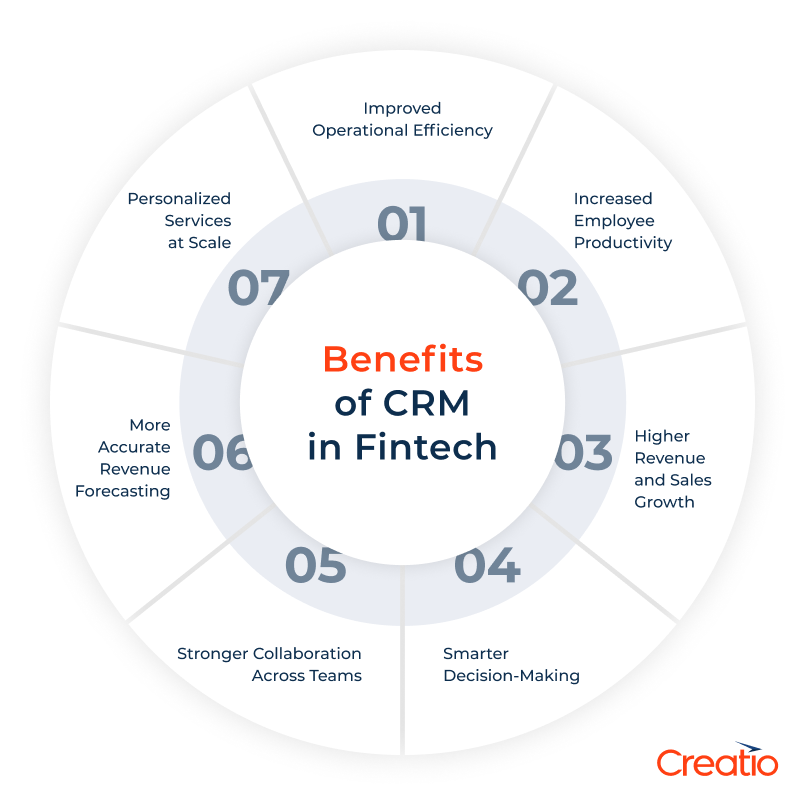
Improved operational efficiency
Fintech companies have to manage large volumes of financial data and customer interactions. With CRM systems the process becomes more structured and consistent, thanks to a unified database and standardized workflows across all departments. This enables fintech companies to minimize manual effort and reduce bottlenecks and errors. Teams that have a dedicated CRM tailored to their needs, can manage more accounts and data with less effort, ensuring operational efficiency, even as user bases expand.
Increased employee productivity
A fintech CRM system increases employee productivity by automating a large portion of their daily tasks and allowing them to focus on engaging with clients. With automated workflows and dedicated tools for managing interactions, documents, and follow-ups, employees can streamline repetitive tasks. Real-time access to accurate customer data, integrated communication channels, and task management features help teams enhance productivity and get done more in less time.
Higher revenue and sales growth
Fintech companies can drive revenue growth by using data provided by the fintech CRM system to streamline sales pipeline management. With a clear visibility into the sales funnel, sales teams can identify high-potential opportunities and move faster to close them. Supported by AI tools, fintech companies can scale sales processes, automate communications, and personalize customer interactions to boost sales efficiency and increase revenue.
Smarter decision-making
With AI-powered analytics and data-driven insights, fintech decision-makers can make more informed decisions regarding business strategy, resource allocation, and future directions. Instead of relying on intuition or error-prone manual data analysis, they can make smart decisions, which are critical in the fast-moving fintech industry. The ability to quickly respond to changes in customer demand and market changes often makes the difference between success and stagnation.
Stronger collaboration across teams
With all customer interactions and activity centralized in one platform, CRMs enable seamless collaboration between marketing, sales, compliance, and support teams. Shared access to accurate, up-to-date customer profiles eliminates silos and allows teams to work together more effectively, improving customer experiences.
More accurate revenue forecasting
Modern fintech CRMs powered by advanced AI tools support not just revenue generation, but also revenue forecasting. Predictive analytics help companies understand trends in their pipeline, assess customer churn risk, and lifetime value, enabling more reliable financial planning and investor reporting.
Personalized services at scale
As fintech companies’ customer base grows, offering personalized services becomes harder. CRM systems allow businesses to scale personalization by automatically segmenting customers, analyzing behavioral data, and delivering valuable customer insights. With AI tools helping generate personalized content and automate outreach and communication, fintech firms can increase engagement and customer loyalty without significantly increasing the manual workload.
Creatio CRM for Financial Institutions
Creatio is an agentic platform to automate CRM and financial workflows with no-code, tailored to business needs of both traditional financial institutions and fintech companies. With Creatio CRM, fintechs can orchestrate end-to-end customer journeys, automate routine tasks, and streamline front and middle office workflows. Thanks to user-friendly interface, composable architecture, and no-code tools, businesses from the financial services industry can customize CRM solutions to their unique business processes, without heavily involving IT departments.
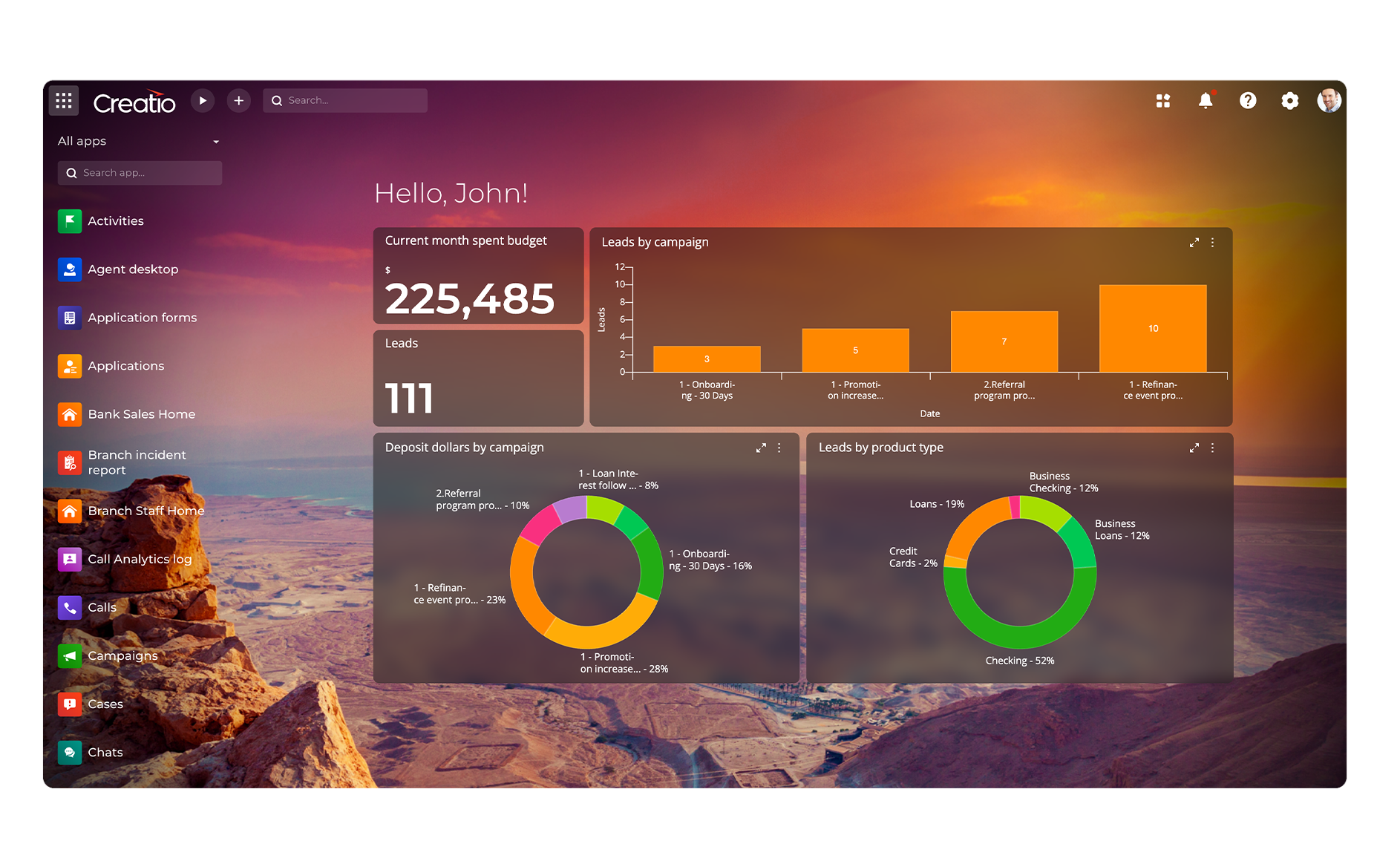
Key features of Creatio CRM for fintech businesses include:
- Customer 360 - offers a 360 degree of customer information, including their demographic data, previous interactions, current portfolio, financial goals and needs.
- Marketing automation - provides tools to streamline marketing processes, such as customer segmentation, campaign management, and management of loyalty and reward programs.
- Sales process automation - enables fintech companies to efficiently manage sales pipelines, accelerates sales cycles, and delivers high-value cross-/up sells recommendations to increase customer lifetime value.
- Onboarding - provides tools for delivering personalized customer onboarding.
- Account opening - automates processes related to opening customer accounts, such as screening and verification.
- Lending automation - streamlines loan application management and automates loan verification workflows to provide personalized loan terms for each client.
- Underwriting and verification - enables in-depth verification of loan application data with flexible checklists and automated review/approval workflows, speeding the process of loan approvals or rejecting.
- Case management - provides automated digital workflows that enable customer service teams to streamline case management and facilitate case resolutions.
- Compliance - offers tools for automating regulatory compliance processes, such as anti-money laundering, KYC, risk management, and internal audit tasks to ensure efficient compliance with industry regulations.
To enhance these features, Creatio offers powerful AI-native capabilities and AI agents as a core part of its platform at no additional cost, that helps fintech companies increase their productivity, personalized interactions at scale, and make smarter, data-driven decisions. Creatio.ai provides all key AI patterns, including predictive, generative, and agentic AI that support everyday fintech processes.
Predictive AI accurately forecasts revenue, predicts customer needs, and offers recommendations regarding next-best-action that help teams across all departments make more impactful decisions. Generative AI helps create personalized content and communication by generating messaging based on insights derived from CRM data. Additionally, Creatio.ai provides agentic AI capabilities in a form of AI agents, which support everyday work across teams by automating actions and enhancing tools to surface actionable insights and increase productivity. All in all, Creatio.ai helps businesses reduce operational inefficiencies and drive new levels of speed and agility, allowing teams to move faster.
Moreover, Creatio provides integration capabilities that enable fintechs to connect their CRM solution with existing systems to ensure seamless data flow. Robust data security measures safeguard sensitive financial data, helping businesses operating in highly regulated financial sectors to adhere to industry standards.
With its industry-specific capabilities, no-code flexibility, and built-in AI, Creatio empowers fintech companies to adapt quickly, operate efficiently, and deliver exceptional customer experiences. Powerful capabilities of Creatio enable fintechs to accelerate time-to-value while staying compliant and competitive in the fintech industry.





















































